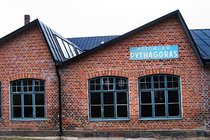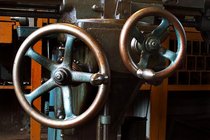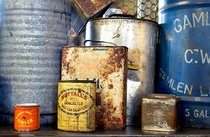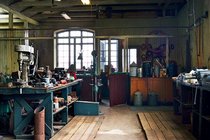Pythagoras Industrial Museum
The Pythagoras Industrial Museum in Norrtälje shows living industrial heritage from the early 20th century, complete with production line and offices.
The Pythagoras factory is in central Norrtälje at the foot of South Hill. Once, this was the largest industry in Norrtälje, with over 80 employees. The company was founded in 1898. Initially, locks and other brass items were manufactured, such as candlesticks, letter racks, letter openers, and lamps. The hot bulb engine was developed after 1908, and this was the product that would make the company famous. The major advantages of the hot bulb engine were its low compression, low rate of revolution and the ability to be powered by pretty much any fuel at all. The engines, however, were bulky and heavy, and it was necessary to heat the bulb with a blowlamp before starting the engine.
Large export sales
The engines were sold to farmers, fishermen and sea pilots. They were exported all over the world under the trademarks “Fram” and “Drott”.
After the Second World War, the growth of the electrical grid undermined the agricultural market for the engines, while in ships and boats, the hot bulb engines were exchanged for diesel engines, which are easier to use and have higher efficiency. Further, the winding up of colonialism led to a reduction in export to the third world. Manufacture was cut back, and stopped completely in 1979.
Saved by enthusiasts
The factory was threatened by demolition at the beginning of the 1980s, and a group of enthusiasts joined together to save it. After several years of intense campaigning, they managed to persuade the municipality, the Swedish government and the county council to contribute the funds required to purchase the factory. It is now managed by a foundation, and day-to-day operation is in the hands of a support club.
During demonstrations, the machines are powered by a generator run by a hot bulb engine. Visitors gain an impression of the working and production conditions during the first half of the 20th century, and can appreciate the significance of the hot bulb engine for Sweden. They also obtain a general impression of living and working conditions in the period.
Links
Closest public transport is the SL stop at Norrtälje bus station.





